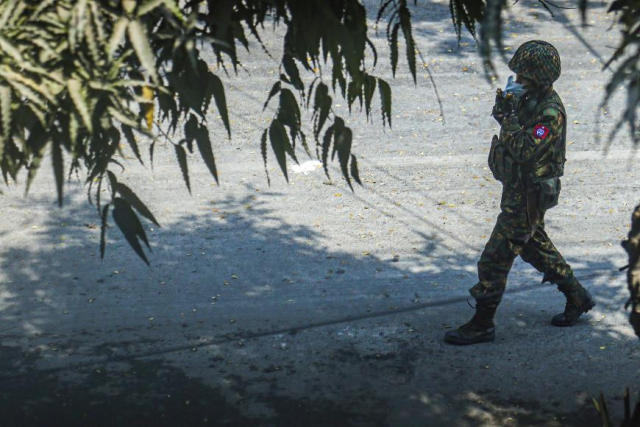Japan: Cut Defense Ties with Myanmar Military
20 December 2021


A Myanmar soldier during an anti-coup demonstration in Mandalay, Myanmar, March 7, 2021. © 2021 Kaung Zaw Hein/SOPA Images/Sipa USA via AP Images
Tatmadaw Cadets Receive Training at Japanese Defense Academy
(Tokyo) – The Japanese government should cut ties with the Myanmar military and immediately suspend a military study-abroad program involving Myanmar cadets, Human Rights Watch said today. On February 1, 2021, the Myanmar military, known as the Tatmadaw, staged a coup and installed a junta that overturned democratic elections.
As of December 10, the National Defense Academy of Japan, a Defense Ministry facility, was still hosting eight cadets from Myanmar, according to a Defense Ministry official. Through the program, the trainees participate in an extensive curriculum of academic and military training, including combat and arms training.
“It’s mind boggling that Japan is providing military training to Myanmar cadets at the same time as its armed forces are committing crimes against humanity against Myanmar’s people,” said Teppei Kasai, Asia program officer at Human Rights Watch. “The Japanese government should immediately suspend the program and any other ties with Myanmar’s military.”
During a Foreign Affairs Committee session on April 14, a Defense Ministry official, Masahiro Kawasaki, said Japan had been accepting cadets from Myanmar since 2015 under article 100 of the Self-Defense Forces Act, which permits the training and education of foreign nationals in Defense Ministry facilities, including the academy, with the approval of the defense minister.
The program allows Japan to showcase how the Japan Self-Defense Forces operate under “strict civilian control” and cultivate “relationships” between self defense forces personnel and students, while increasing “mutual understanding” and “trust” between Japan and the students’ countries, Kawasaki said. He added that Japan would consider the concerns about the program while monitoring the situation in Myanmar closely.
The February coup resulted in the arrest of civilian leaders of the national and state governments, including Aung San Suu Kyi, and an announced one-year “state of emergency.” Since then, junta military and police forces have killed more than 1,300 people and detained over 10,000. Junta-controlled courts have sentenced hundreds to prison terms and sentenced 75 people, including 2 children, to death, according to the Assistance Association for Political Prisoners. Widespread and systematic killings, torture, and sexual violence have amounted to crimes against humanity.
In August 2017, two years after Japan’s training program began, the Myanmar military under commander-in-chief Sen. Gen. Min Aung Hlaing carried out mass atrocities against the ethnic Rohingya in Rakhine State, forcing more than 740,000 to flee. At least 600,000 Rohingya remaining in Myanmar are confined to camps and villages under guard of local authorities and security forces, under conditions that amount to the crime against humanity of apartheid. And in long-running armed conflicts with ethnic armed groups, the Myanmar military has for many years committed summary killings, rape, indiscriminate shelling, torture, and arson, among other war crimes.
Since the coup, Tokyo has called for an end to violence and the release of elected government officials, including Aung San Suu Kyi. On March 28 Japan’s Defense Ministry issued a joint statement with 11 other countries criticizing the Tatmadaw’s use of military force against “unarmed civilians.” The Japanese government halted new non-humanitarian Official Development Assistance (ODA) projects earlier in 2021 while allowing existing aid projects to continue. The Diet passed a resolution in June that condemned the coup and called for a “swift restoration of the democratic political system.”
In March, Australia, one of Japan’s major defense partners, suspended its military cooperation with Myanmar because of the military’s deadly crackdown on anti-coup protesters. The Defense Cooperation Program was limited to non-combat areas such as English language training.
“Japan should follow suit with Australia and immediately cut ties with the Myanmar military,” Kasai said. “Japan should not be supporting and endorsing Myanmar’s extremely abusive armed forces by training Tatmadaw soldiers.”
Announcements
21 May 2025
Open letter: Malaysia must lead ASEAN with principle, not hypocrisy, to address the Myanmar crisis

Progressive Voice is a participatory rights-based policy research and advocacy organization rooted in civil society, that maintains strong networks and relationships with grassroots organizations and community-based organizations throughout Myanmar. It acts as a bridge to the international community and international policymakers by amplifying voices from the ground, and advocating for a rights-based policy narrative.